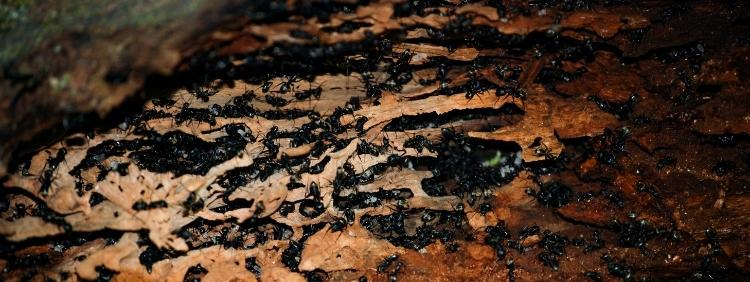Cambridge Pest Control: Can Carpenter Ants See In The Dark?

People often undervalue and underestimate the natural world around them. With the technological advantages afforded humans, it is easy to forget the essential skills and evolutionary advantages required to survive. Animals and insects do not have the luxury of homeownership or grocery stores; they must fight, scrap, and forage for everything crucial to survival. Carpenter ants, despite their stature, are among the world’s most versatile survivors, which is why you should call carpenter ant pest control in Cambridge at the first sign of these little buggers in or around your home.
One of the most impressive aspects of any ant species is the ability to navigate. In a single day, an ant can travel up to four miles. In its lifetime — one to three years — the average ant can travel approximately 3,000 miles. The reason ants can achieve such distances, despite remaining close to home, is they tend to work throughout the day and night. Because ants continue to work through the night, it raises questions about their eyesight.
Can Carpenter Ants Navigate in the Dark?
In general, ants tend to live in dark spaces, meaning they need to adapt to such surroundings. Aside from living in the wood, carpenter ants do most of their foraging at night; therefore, the species evolved to have larger eyes with wide photoreceptors, allowing for tremendous night vision.
However, even without night vision, ants can navigate their surroundings by scent. Using pheromones, ants create scent trails; these trails help ants communicate and navigate their surroundings. Additionally, ants have sensitive antennae, allowing for navigation through touch.
Do They See Differently During the Day Versus at Night?
While many ant species primarily forage at night, many also need to travel during the day. Nightvision is a significant advantage to twilight foraging, but the wide photoreceptors become a liability during daylight hours. To reduce the risk of damage to the eyes, ants have sophisticated pupils that limit the amount of light that can access the internal eye. Additionally, unique light detectors can act as skylights to help the ant determine the direction of the light source.
Ants do see differently from night to day. However, because the species has several other navigation traits, it is a capable traveller and worker regardless of the time.
Do Ants Sleep or Nap?
To look at a colony, it would appear that ants work nonstop, pulling 24-hour shifts without so much as a catnap. However, looks can be deceiving.
Worker ants typically take one-minute naps at regular intervals throughout a 24-hour period. A single ant will usually take 253 naps throughout the day, equating to a little more than four hours per day.
A queen ant is more privileged than worker ants, getting 90 six-minute naps per day. The queen will average nine or more hours of sleep per day, which can explain her extended lifespan. Queens live years, but worker ants live only months.
How To Avoid Ant Infestations
As fascinating as ant colonies are, you do not want one thriving in or off of your home. One of the best ways to prevent ant infestations is regular cleaning and maintenance.
If you vacuum after every meal, do the dishes, and mop floors, you are less likely to see ants in your home because there is a limited food source. You should also store food in airtight containers to eliminate access.
However, hiring a professional service is the most effective way to prevent or eliminate an infestation. A pest control company will have the expertise and tools to resolve any ant problems.
Have you noticed any ants on your counters or floors? Contact Truly Nolen right away and schedule a property assessment.